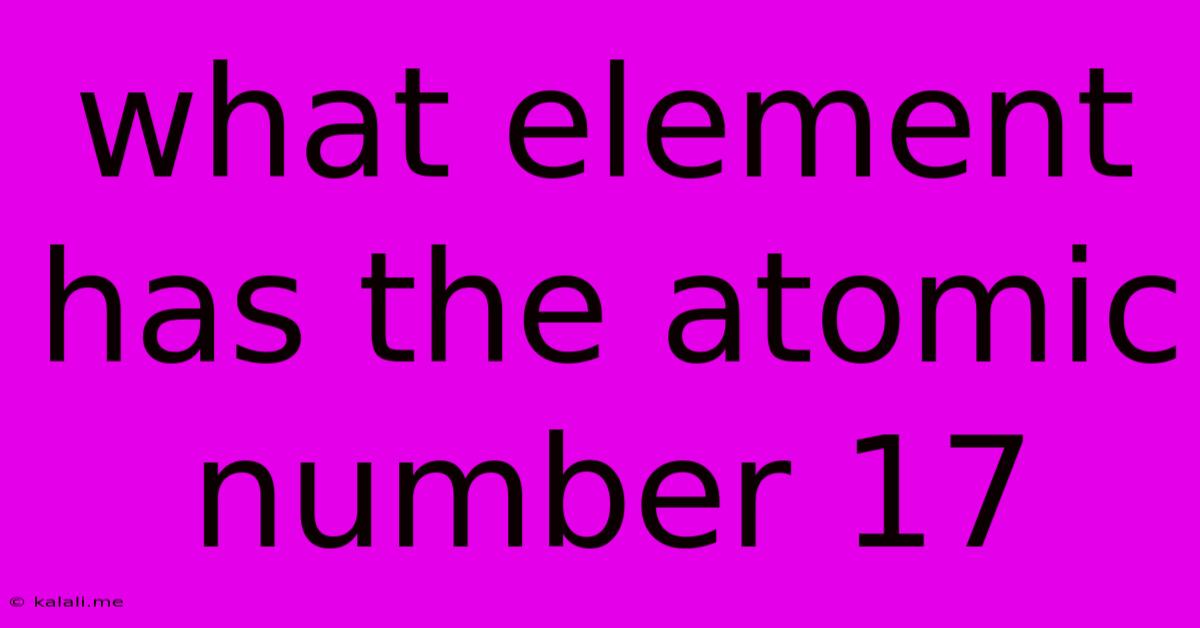What Element Has The Atomic Number 17
Kalali
Jun 14, 2025 · 3 min read

Table of Contents
What Element Has Atomic Number 17? Unlocking the Secrets of Chlorine
What element has atomic number 17? The answer is chlorine, a highly reactive nonmetal with a fascinating array of properties and applications. This article delves into the characteristics, uses, and importance of chlorine, exploring its role in various aspects of our lives. Understanding chlorine's atomic structure and chemical behavior provides valuable insight into its widespread significance in both natural and industrial contexts.
Chlorine, with its atomic number of 17, is located in Group 17 (also known as the halogens) of the periodic table. This group is characterized by highly reactive elements with seven valence electrons, readily forming negative ions (anions) to achieve a stable electron configuration. This reactivity is a key feature of chlorine and explains many of its properties and applications.
Properties of Chlorine: A Closer Look
- State: At room temperature, chlorine exists as a pale green-yellow gas, a distinctive characteristic easily recognized in laboratory settings or industrial applications.
- Reactivity: As mentioned, chlorine's high reactivity stems from its electron configuration. It readily forms covalent bonds with other atoms, particularly those with readily available electrons. This leads to the formation of numerous chlorine compounds.
- Oxidation States: Chlorine exhibits variable oxidation states, meaning it can exist in various chemical forms depending on the bonding environment. Common oxidation states include -1, +1, +3, +5, and +7.
- Toxicity: In its elemental form, chlorine gas is toxic and corrosive. Exposure can cause respiratory irritation and even death at high concentrations. However, many chlorine compounds are relatively safe and even essential for human health.
- Solubility: Chlorine is moderately soluble in water, forming hypochlorous acid (HOCl), a powerful disinfectant used in water treatment.
The Many Uses of Chlorine
Chlorine's unique properties make it essential in a multitude of applications, including:
- Water Purification: Chlorine is a vital component in water disinfection, effectively eliminating harmful bacteria and viruses, ensuring safe drinking water for millions worldwide. This application is crucial for public health and sanitation.
- Industrial Processes: Chlorine is extensively used in the production of various chemicals, including polyvinyl chloride (PVC), a widely used plastic, and numerous other organic compounds. Its use in industrial processes is vast and varied.
- Bleaching Agent: Chlorine and its compounds are also effective bleaching agents, widely used in the paper, textile, and pulp industries. This application leverages its strong oxidizing power.
- Medical Applications: Certain chlorine compounds play a role in medicines and disinfectants, contributing to various healthcare applications.
Safety Considerations & Environmental Impact
Due to its reactivity and toxicity, handling chlorine requires careful attention to safety protocols. Proper ventilation and protective equipment are necessary in environments where chlorine is used. Moreover, the environmental impact of chlorine use needs careful consideration. Release of chlorine into the environment must be controlled to minimize its potential negative effects on ecosystems. Sustainable practices in chlorine production and usage are increasingly emphasized.
In conclusion, the element with atomic number 17, chlorine, plays a significant role in many facets of modern life. Its high reactivity and diverse properties make it invaluable in water purification, industrial processes, and various other applications. However, responsible handling and environmental considerations are vital to ensuring its safe and sustainable use. Further research into chlorine chemistry and its applications continues to reveal new possibilities and challenges.
Latest Posts
Latest Posts
-
Which Of The Following Is Not Considered Appropriate Email Etiquette
Jun 14, 2025
-
Which Of The Following Is Not A Major Mineral
Jun 14, 2025
-
Whats The Square Root Of 149
Jun 14, 2025
-
What Are The Factors For 62
Jun 14, 2025
-
Si Unit For Density Of Water
Jun 14, 2025
Related Post
Thank you for visiting our website which covers about What Element Has The Atomic Number 17 . We hope the information provided has been useful to you. Feel free to contact us if you have any questions or need further assistance. See you next time and don't miss to bookmark.